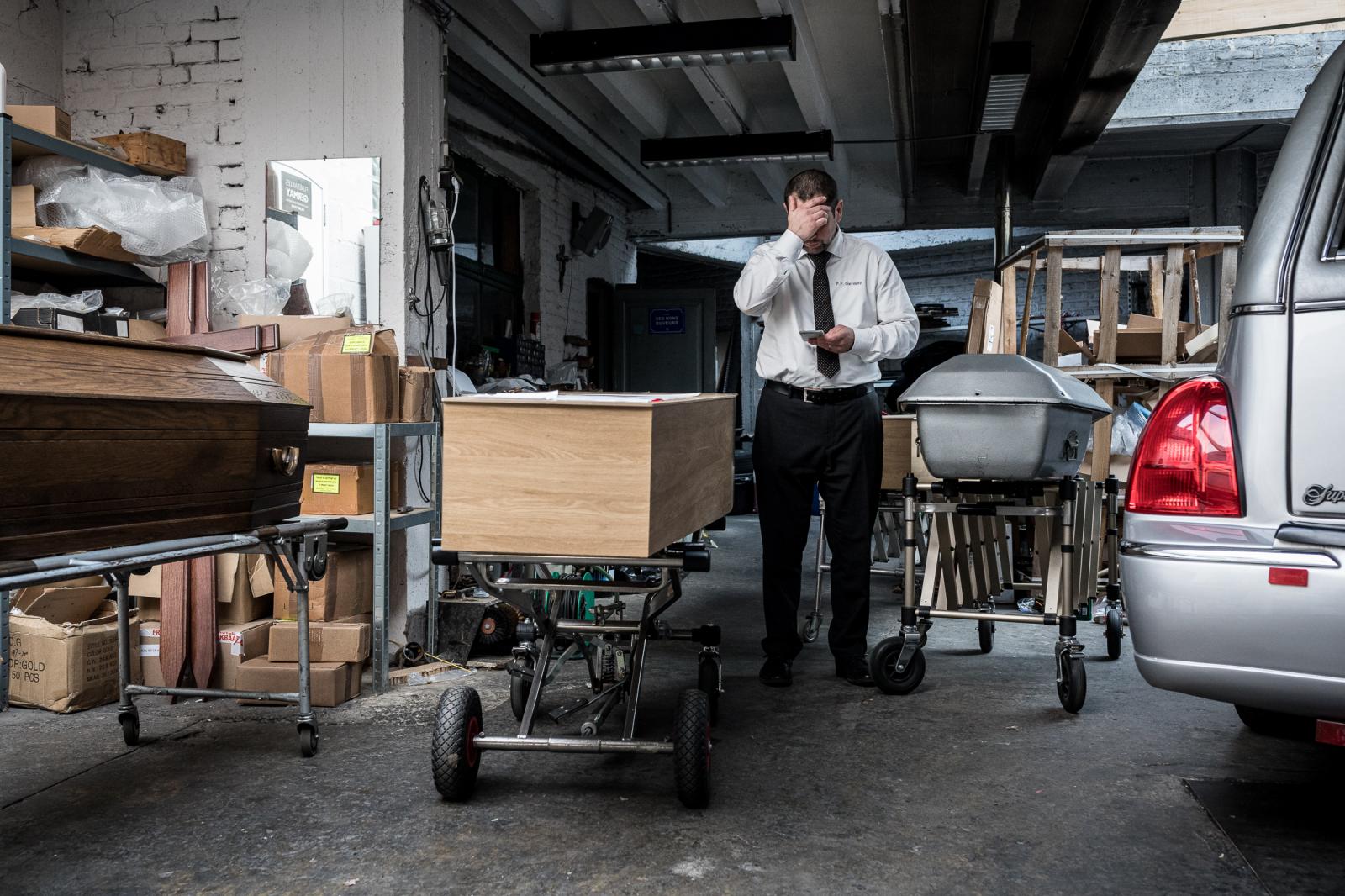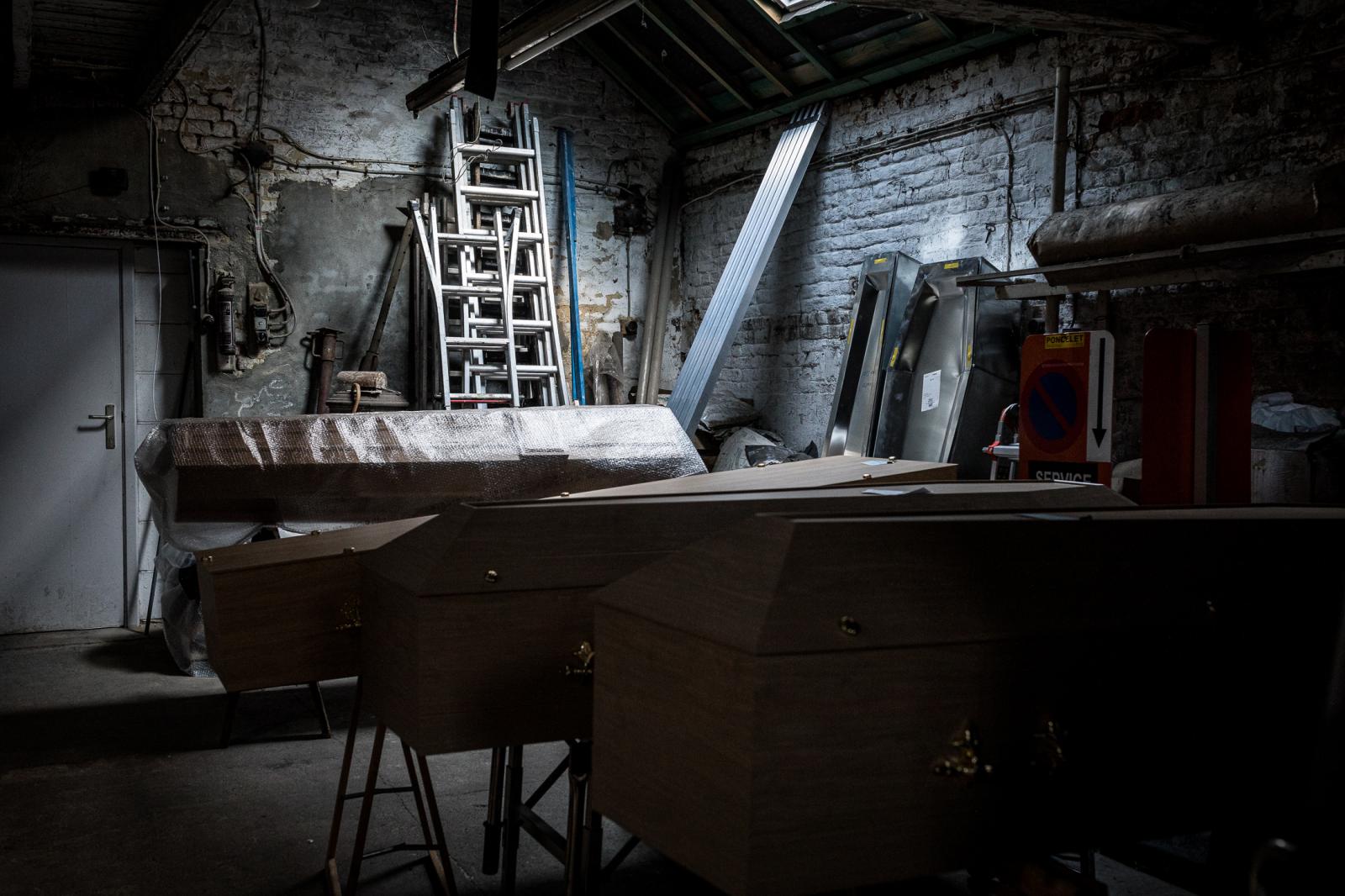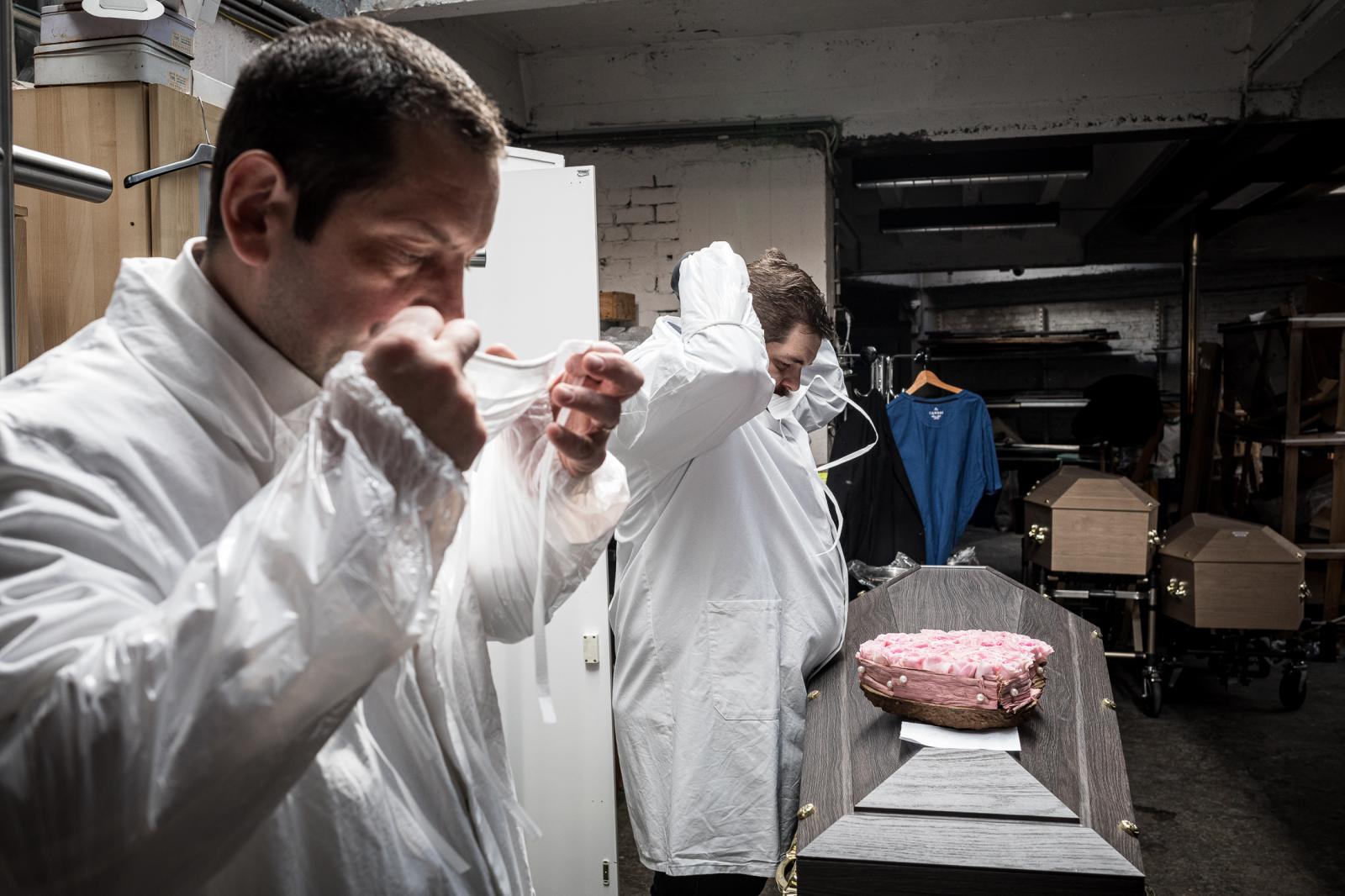Public Story
Croque la mort
David Weise, 45 years old, is in charge of a small funeral home in the Outremeuse district of Liège. This is a popular neighbourhood where the Funeral Service team is well known to everyone.
This funeral home, on a human scale, is known for the quality of its services. The size of the company was not adapted to such a pandemic. Yet the company thought it had seen others, founded in 1898, it is the fifth generation.
This SARS-CoV-2 pandemic, no one had foreseen it and it struck with such force and so quickly.
But David and his team are coping and trying as much as possible to provide quality service with humanity and respect. This is the company's guiding principle and despite the crisis, it must continue to do so.
The media has highlighted several professions during this pandemic. But at the Germay Funeral Home, everyone feels like they have been forgotten during the crisis. They are not the only ones, of course, but the lack of help from the government and the obligation to continue funeral services without a minimum of logistical support is really complicated.
Between March 18th and May 26th, more than 80 deaths had to be dealt with. By way of comparison, they usually handle about 20 deaths per month. And they no longer count deaths from pneumonia and other respiratory sceptic shocks. Some death notices listed the causes of death even before lockdown. This suggests that the team may have been managing bodies with this virus before containment began. As a reminder, lockdown began on March 18th in Belgium.
From the very beginning of the lockdown, obtaining protective equipment was extremely complicated, if not impossible. For the safety of the whole team, however, working with adequate protection is necessary. But often, basic surgical masks are used for protection. When lockdown was introduced, the company had a few FFP2 masks and five full body suits in stock.
These FFP2's should be reserved for situations where the risk is higher. No choice without being able to find reliable suppliers.
Integral suits are also intended for situations with a high risk of transmission. Often fabric jackets are sufficient to provide the bare minimum, washed daily, but they seem to be quite vulnerable against the deadly virus.
The National Professional Union of Funeral Directors (UPNPF) has sounded the alarm since the beginning of the pandemic, however, it is necessary to help the funeral directors, letting them go and collect the bodies without adequate protection is putting an entire profession in danger.
This profession has always had its share of mysteries. Mysteries that are not mysteries, however, their work is direct and straightforward. Since the dawn of time, undertakers have had a job in the shadows, a difficult and unpleasant job. David doesn't see it that way. It is a job of respect and guidance where humanity is often more necessary than elsewhere. And this is what David feels during this pandemic, doing such a complicated job without being able to offer a human service. The victims die alone, but the families also feel this loneliness. It's impossible to visit one last time if the patient is confirmed Covid. Impossible to hug him or say goodbye. Most of the time, it is the nursing staff who is their last link with this life.
The days go by, the hours fly by for the whole team. Sleep is often short and not very restful. Calls come in day and night. Visits to nursing homes to retrieve bodies follow visits to the morgue or to certain homes.
Protect yourself at all costs, avoid catching this virus. But still, to provide an appropriate accompaniment service to bereaved families.
A delivery has been received, the masks promised by the government have arrived. David and his employees are hoping for FFP2, they are in fact only surgical masks! They will go in the locker, for another use, for later, when everything will be better.
The work of the undertaker is not easy, the one hidden from everyone exhausts him, yet he remains human.
Because in addition to this work of collecting bodies, collect yes! Because it is necessary to speak well thus so much the coffins containing bodies accumulate in the rooms of the small family business. It is also necessary to reassure the families and explain the rules put in place by the government to slow down the spread of the virus.
Tension is important because there is not enough space for the bodies. The city of Liège is obliged to provide the local undertakers with a refrigerated semi-trailer, installed in the parking lot of the Robermont Crematorium. Barely hidden by a few canvas fences, it allows the funeral companies of the region to come and deposit a body there and take it back according to the cremation schedule and family visits.
The cremation centre is well equipped and can accommodate more than fifty bodies, but the numbers there exceed anything we've seen before.
The pandemic calls for reorganization. No more than five people at a time in the funeral home for visits. And only fifteen people outside. David and his team have to adapt and enforce family guidelines. It's not easy, not everyone wants to play the game. If the families do not respect the instructions, the Police risk a heavy charge to the company and to each person present who does not respect the instructions. 2500€ for the Funeral Home, 250€ for each person. "You might as well avoid this at this time of year, it's already sad enough for you," David asks the families. It's so sad not to be able to take a loved one in your arms and give them comfort. But no, it's impossible. You have to respect this social distancing and the barrier measures that have been put in place.
The worst, for his family and loved ones, is yet to come. No ceremony is possible to pay a last homage to the departed, it is impossible to enter the cremation centre, the urn containing the ashes is given to you or, for families who wish, a dispersion on a nearby grass is possible. But in small numbers, at a good distance and with a mask.
A painful moment and made even more impressive by the protective gear worn by the gravediggers. Obligation of the municipal administration to protect its staff!
David, stoic but not without emotion, attends all these moments. It is his job. But now, he admits it, he is having trouble keeping up. He has to, but it's so difficult not to be able to accompany, as he usually does, all these bereaved people.
But let's ask ourselves, what would we have done without them? How would we have dealt with those thousands of bodies? And who would have done it under these conditions?
And yet, David and so many others did it and without complaining, they faced up to it and imposed health rules on themselves to protect themselves as much as possible. They hope for a calming down but already dread a second wave, we are talking about it... The future will tell.
The Covid19 pandemic in Belgium caused about 10,000 deaths and 60,000 people were infected.
On a national scale, the mortality rate is very high. As a reminder, Belgium has about 11.5 million inhabitants.
The mortality rate is more than 16%, which puts Belgium in second place in the sad ranking of countries hit by the Covid19 pandemic. The first being, currently, Yemen.
































